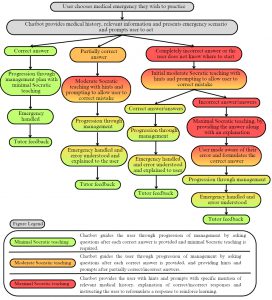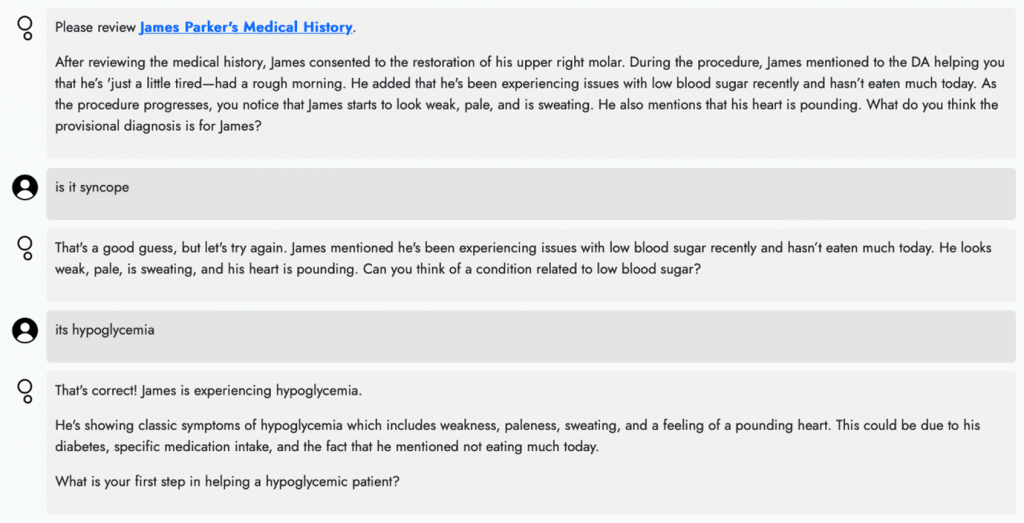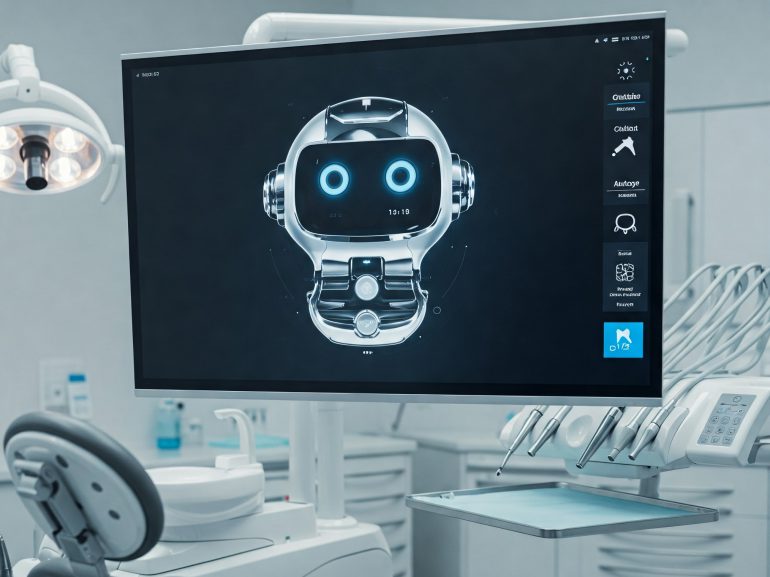Medical emergencies are common in dental settings, yet many practitioners feel underprepared. A 10-year study in Great Britain found 70.2% of dentists encountered at least one emergency, while a German study reported 57% faced at least three annually and 36% faced at least ten. Despite this, 37.5% of final-year dental students and recent graduates feel inadequately prepared to manage such situations.
To address this critical gap, our team at the University of Sydney has developed an innovative approach that combines simulation-based learning with Socratic teaching methods and generative artificial intelligence (Gen AI). This integrated solution leverages AI-powered chatbots to stimulate critical thinking, develop clinical reasoning skills essential for emergency management, and provide students with repeated practice opportunities in a safe learning environment.
This project has been carried out by in collaboration with dental student partners: Christopher Kadamani, Maya Matty, Tian Hao Zhu and Harish Vijay
Developing the AI-powered medical emergency simulations
Our team developed an AI chatbot powered by ChatGPT-4 on the Cogniti platform to simulate medical emergencies in dental settings. After exploring several options, including Inworld and Claude, we selected Cogniti from the University of Sydney for its user-friendly interface and superior natural language processing capabilities.
The development process involved three key stages:
- Creating a comprehensive database of common dental emergencies (endocrine, neurovascular, and respiratory) with detailed management protocols
- Configuring system prompts to enable the chatbot to respond using Socratic teaching methods
- Implementing an iterative testing process with approximately 220 refinements to ensure accuracy and effectiveness
Socratic teaching in practice: how the chatbot adapts to student learning

The beauty of this approach lies in how the AI chatbot employs an adaptive Socratic teaching method that responds to students’ knowledge levels. When students interact with the chatbot, they encounter a realistic medical emergency scenario and must provide a provisional diagnosis and management plan. The chatbot then categorises responses as correct, partially correct, or incorrect/unsure and adjusts its teaching accordingly:
- For correct answers: Minimal Socratic teaching with praise and progression to the next step
- For partially correct answers: Moderate Socratic teaching with targeted hints and relevant information to guide students toward the correct answer
- For incorrect/unsure answers: Initially moderate Socratic teaching, escalating to comprehensive guidance with detailed explanations and additional resources
Upon completion of each scenario, students receive personalised feedback highlighting their strengths, areas for improvement, specific mistakes, reflective questions, and important distinctions in management protocols (figures 1 and 2). This tailored feedback loop creates a safe space for students to make mistakes and learn from them before facing real-world emergency situations.

What do students think?
Although this initiative is still in its early stages, preliminary feedback from students has been encouraging. Third-year dental students who participated in our initial pilot highlighted the practical benefits:
It was helpful to engage with scenarios that reflected real-life situations. The platform made it easy to revisit and reinforce key steps in managing medical emergencies.
(third-year dental student, 2025)
I found the chatbot useful for consolidating knowledge in a more interactive way compared to traditional revision methods.
(third-year dental student, 2025)
Their comments suggest that the AI-powered approach is succeeding in creating authentic learning experiences and offering more engaging alternatives to traditional study methods.
Adapting this approach in your own teaching context
Advantages
This AI-powered Socratic tutor offers several advantages for dental education that could benefit teaching across multiple disciplines:
- Creates a safe learning environment for practising high-stakes scenarios without real-world consequences
- Delivers personalised feedback tailored to individual students’ knowledge gaps
- Maintains a consistent teaching approach that combines simulation-based learning with Socratic methods
- Provides accessibility for independent practice outside traditional classroom settings
While promising, challenges remain, including ensuring data privacy and maintaining AI reliability. It’s important to note that this approach is designed to supplement, not replace, traditional teaching methods.
Want to try this approach?
If you’re interested in implementing AI-enhanced Socratic teaching in your own context:
- Start by identifying the high-stakes scenarios in your discipline that would benefit from simulation
- Focus on creating clear system prompts that guide the Cogniti to use Socratic questioning appropriately
- Involve students in the testing and refinement process to ensure the system meets their learning needs
What’s next?
Future research will assess the chatbot’s effectiveness in educational settings compared to traditional teaching methods and explore its potential integration with avatars in a 3D or VR platform to enhance engagement and realism. With further refinement, this technology has the potential to transform medical emergency education in dentistry by providing accessible, consistent, and personalised training experiences for students.
By addressing the critical gap between theoretical knowledge and practical application, the integration of generative AI, simulation-based learning, and Socratic teaching methods has the potential to enhance students’ confidence and competence in managing challenging situations across various professional fields.





